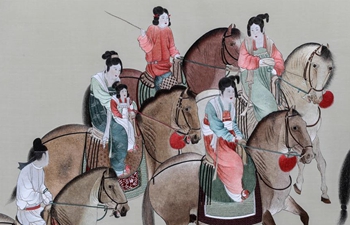
Engy Tarek (L), co-founder and deputy chief of Cairo Animal Rescue Team (CART), and her colleague work at a dog shelter in Giza, Egypt, on July 5, 2018. With "the Voice of the Voiceless" as its slogan, Cairo Animal Rescue Team (CART), a vast dog shelter now home to about 800 dogs in Giza province near the Egyptian capital Cairo, sends its volunteers to reported cases of stray dogs in distress, like mangy dogs or those paralyzed, shot in the legs, hit by cars, beaten, burnt or strangled by people. (Xinhua/Ahmed Gomaa)
by Mahmoud Fouly
CAIRO, Aug. 4 (Xinhua) -- "We take care of sick and wounded stray dogs, for they cannot ask for help like humans. We welcome them to their new home and we never return them to the streets after recovery," said Engy Tarek, co-founder and deputy chief of Cairo Animal Rescue Team (CART), a vast dog shelter in Giza province near the Egyptian capital Cairo.
With "the Voice of the Voiceless" as its slogan, CART sends its volunteers to reported cases of stray dogs in distress, like mangy dogs or those paralyzed, shot in the legs, hit by cars, beaten, burnt or strangled by people.
"We started with 30 dogs five years ago, and now the shelter is home to about 800 dogs," the young lady told Xinhua at the shelter while taking care of a dog wounded by a collar embedded in the neck.
The main shelter is located in Awsim district of Giza on an area of less than one feddan (some 4,000 square meters) in addition to a nearby apartment and a villa, all rent by CART to host the animals.
Once the main gate opens, hundreds of local street dogs, known in Egypt as baladi dogs, are seen in the spacious main yard with wooden partitions and large bowls of water and food in the middle. They continue barking so loudly when strangers come in.
On the left side of the shelter, there are a clinic and a couple of rooms for confined dogs under treatment as well as a couple of rooms for the staff members who have to stay in the shelter and go home only on holidays or vacations.
Tarek first met with Abdo Joe, now CART CEO, when they were both individual animal rescuers and they decided to open a licensed dog shelter together. Sharing the same interests, they have become a couple too.
Donations cover 20 to 40 percent of the shelter expenses that amount to about 4,000 U.S. dollars per month, and the rest is mostly paid from their own pockets.
"Sometimes the donations are insufficient because many Egyptians lack the culture of animal rescue and they'd rather donate for humans," Tarek told Xinhua, urging for promoting the culture of donation for saving animals that cannot ask for help.
"Actually, the dogs scream for help and beg for mercy, but most humans don't understand or listen," she lamented.
The shelter hosts all kinds of dogs without discrimination, whether they are baladi or breeds such as golden retrievers, huskies, labrador retrievers, German shepherds, pit-bulls, boxers and many others.
"Most of the breeds have either been forsaken by their owners or got lost and couldn't adapt with the surroundings to survive. So, we try to provide them with an atmosphere similar to that at home," she explained.
The shelter is distinguished with the treatment of most difficult injuries or illnesses and its reception of any case at any time 24/7.
CART has a well-known Facebook with tens of thousands of followers where people can report any case nationwide, post the case with a picture and give the address so that the shelter volunteers can go for the dog's rescue.
The shelter founders call on the government for support of such rescuing efforts and the parliament for a bill that preserves the lives of such helpless animals.
CART has six regular workers excluding the vet. All the workers have gone through a training course on ABC medication, like how to insert a cannula, how to give a shot, what to do when the dog's temperature is too high or too low, etc., but stitching is only done by the vet or his assistant.
Sayyid Abdel-Naby, a man in his 30s who has been working for CART since its establishment, said that the shelter managers treat him very well that he doesn't consider himself a worker but an owner of the shelter, which makes him love the place and spare no effort to help the animals.
"I initially love animals, particularly dogs, for they are so loyal and they never betray their friends," Abdel-Naby told Xinhua, adding that "while working on some injuries I feel they are in my own body, but when the dog completely recovers I feel I am the happiest person on earth."
The veteran rescuer stressed that the decreasing capacity and the limited source of finance are the biggest challenges facing CART due to the growing number of dogs coming to the shelter.
Some of the recovered dogs get chances for adoption outside Egypt, such as the United States, Canada, Germany and other Western states. The shelter used to send from 10 to 15 dogs together abroad for adoption, but now the authorities restricted the number to two.
Capito, a little recovered baladi dog, is scheduled to travel soon to Germany to be adopted by a family there. Once approved by the authorities and before it travels abroad, the shelter will provide the dog with a certificate including details about its health condition, vaccination and everything, as well as a microchip if available.
Although the shelter is meant for dogs, it does not decline any other animal that needs rescue. The shelter also has two donkeys and more than 80 cats that are receiving treatment and rehabilitation.
Karima Samir, a female history student in Cairo's Ain Shams University, said it's easy to deal with dogs for their loyalty and kindness, unlike what many people may think, noting that she constantly educates herself about rescuing dogs by reading, surfing the Internet and watching relevant videos.
"I feel their pains and needs and I can tell whether they are sick, hungry or thirsty just by a look into their eyes," the young woman told Xinhua, noting that a paralyzed dog and another shot in the legs are the most difficult cases she's currently working on at the shelter.















